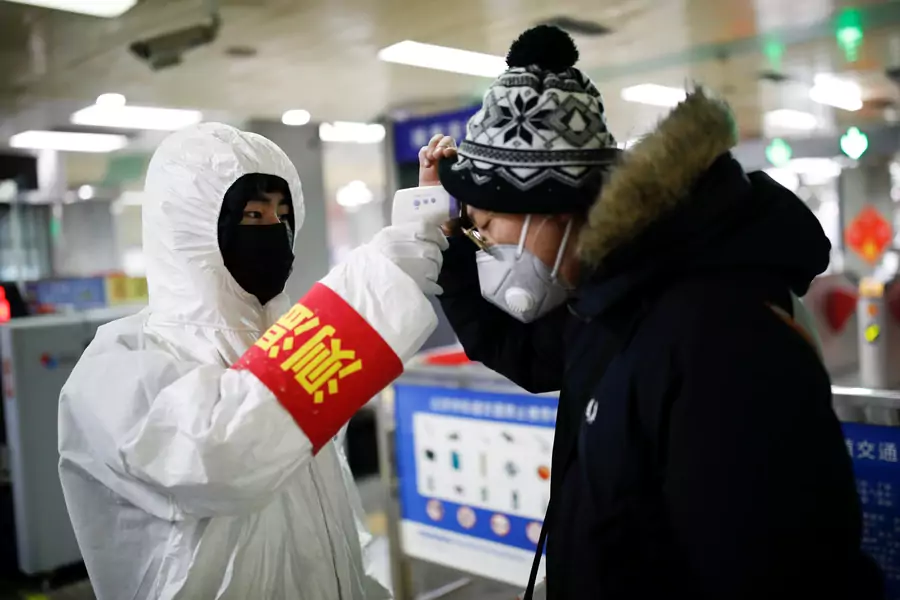Chinese Tech Responds to the Coronavirus

As the new coronavirus has spread from Wuhan to the rest of China, and the central government has mobilized to control an outbreak that has so far killed more than 560 people, Chinese technology firms have played a prominent role in the battle against the epidemic. These efforts are designed to reinforce the government’s response and insulate the companies from public backlash. They are also likely to tie the tech sector to the state even more tightly than before.
First, a number of companies have provided technological support to doctors, nurses, and others on the front lines. China Mobile, China Telecom, China Unicom, and Huawei have all provided 5G equipment and services to the newly constructed Huoshenshan Hospital in Wuhan. Lenovo also donated equipment, and Alibaba has said it will provide public research institutions free access to all AI capabilities needed for the development of vaccines and new drugs. The cybersecurity company Qi Anxin is providing free services to government departments, medical and disease control centers, media, and other organizations involved in the prevention and control of the outbreak.
More on:
Second, firms are contributing money, goods, and services to health care providers and victims. Over 2.575 billion yuan has been donated by tech companies. Alibaba set up a 1 billion yuan special fund for medical equipment; Tencent established a 300 million yuan prevention and control fund; Baidu set up a 300 million yuan drug R&D fund; and Ant Financial established a fund to provide benefits for medical workers who contract the virus (100,000 yuan) and the families of medical workers who die from it (500,000 yuan). Xiaomi and 360 Security have shipped masks and testing kits to Wuhan, and Didi has given free taxi services for medical staff in Wuhan.
Third, Chinese tech companies are helping Chinese leaders shape the flow of information. As the government threatens prison sentences up to fifteen years for spreading rumors or criticizing the official response to the virus, WeChat has vowed to permanently ban or limit account functions for users who maliciously disseminate rumors related to the epidemic. Tech companies have also helped spread official information. WeChat launched a heat map to show diagnoses across the country, and Baidu and WeChat have a function that shows hospitals and health clinic information from public health authorities. China Mobile and China Unicom have sent more than four billion text messages containing “epidemic early warnings, real-time traffic updates, public health suggestions, and prevention and control information to prevent the spread of harmful information and rumors on the internet.”
These efforts in corporate social responsibility have historic roots in China. After the 2008 Sichuan earthquake, many Chinese firms provided material and financial support, often in response to public pressure. The public attacked firms that were seen as stingy, while firms that were seen to react quickly generated very favorable responses from consumers. These same dynamics are playing out in Wuhan, where tech companies are trying to manage public sentiments.
Yet, there is a new trend occurring during the coronavirus outbreak that was not present after the 2008 Sichuan earthquake. Amid efforts by Chinese tech companies to provide assistance, Chinese officials have called for greater integration of big data to track infected individuals. As the Wall Street Journal reports, China is using its significant surveillance capabilities and data from state-owned enterprises, including airlines, phone companies, and public transportation systems, to track the virus and quarantine the ill. These efforts are highlighted in Chinese news as evidence of the social good that can come from the collection of big data. For example, a new policy in Xi’an requiring those taking the subway to register with their government-issued IDs and undergo temperature checks has been praised in Chinese media for its contribution to preventing and controlling the spread of the epidemic.
However, the Chinese government needs greater cooperation and data sharing with the private sector to fulfill its epidemic prevention and surveillance ambitions. This has inevitably drawn private tech companies closer to the state. Baidu, for example, has developed an AI-based contactless temperature detection technology that is now being used in Beijing train stations to quickly detect and record passengers’ temperature. Similarly, Baidu and Alibaba have developed AI-enabled data collection systems for cities across China that call or prompt people to answer questions related to the virus in an effort to improve disease monitoring.
More on:
Ultimately, the epidemic has given the Chinese government an argument for acquiring and monitoring private sector data. This has tied tech companies closer to the state and led to an increase in surveillance in the name of public health.
 Online Store
Online Store